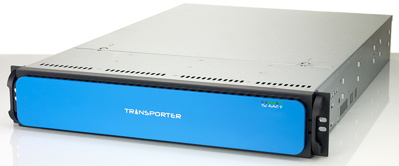Connected Data Transporter Genesis: Private Cloud Appliance to Deliver Dropbox-Like Functionality
Starting at 12TB for $9,999
This is a Press Release edited by StorageNewsletter.com on October 31, 2014 at 2:36 pmConnected Data, Inc. unveiled Transporter Genesis, a private cloud storage platform to combine the modern file management features of public cloud storage services like Dropbox or Box with the visibility and control offered by a NAS from vendors like NetApp.
Transporter Genesis enables organizations to keep cloud data on-site without having to pay recurring monthly fees, manage storage capacity limits or replace legacy storage systems.
Built on Transporter technology with over 11,000 global systems in active daily use, Transporter Genesis enables IT administrators to create a completely private cloud storage system that allows employees to sync, access and share files from all of their authorized computers and mobile devices. Multiple Transporter Genesis appliances can work together as a unified system to locate data where required for performance, and to simplify the task of adding users and capacity. Transporter Genesis is designed for organizations of all sizes, including those with remote offices and mobile employees and for those in regulated industries such as legal, healthcare and financial services.
“The fact that cloud storage providers like Box and Dropbox are furiously undercutting one another on price even as they’re losing money proves the current public cloud storage business model is unsustainable,” said Dr. Geoff Barrall, CEO, Connected Data. “The vast majority of cloud storage users do not pay monthly subscription fees, and we’ve seen customers of services like Nirvanix and Megacloud forced to scramble to retrieve their data after those companies went out of business. Transporter Appliances are owned and managed by the company, removing any uncertainty around the longevity, privacy or location of data. Because organizations own and control the Transporter Genesis hardware, they can leverage their existing infrastructure and simply add appliances in a grid-like fashion to sync offsite and scale as needed without having to deal with increasing complexity or monthly fees.“
Solving CIO’s Dilemma
As consumers continue to adopt public cloud services to store their personal photos, videos, and music collections, they want the same level of convenience to access work files in the office, on the road and at home. That has led to employees increasingly using public cloud storage without the permission of their IT departments, greatly increasing the risk of information loss or theft and potentially violating industry and government regulations.
“There is a lot of pent up demand for online file sharing solutions that store data on premises, even for those companies that have already deployed solutions in the cloud. Our research shows that almost 70% of businesses that already use public cloud file sharing services are extremely interested in running private file sharing services, allowing them to store the data in their own data centers, and that’s exactly what Transporter Genesis enables,” said Terri McClure, senior analyst, ESG. “Connected Data is delivering a solution that can help end the on-going battle between IT and employees over the use of cloud services by giving each side exactly what it wants.“
Beginning of End for Traditional File Servers
As employees become more mobile and work in remote offices, traditional file servers and NAS can actually become a hindrance to collaboration and file sharing. Transporter Genesis represents a improvement over how users access and organize files.
While file servers and NAS provide IT and storage administrators with the ability to control the location of data, employees must suffer through multiple shortcomings. Remote access is limited to certain computers and requires going through a complicated and unreliable VPN. Even If users are successful in getting to the server, they still must navigate a shared drive hierarchy that only makes sense to the person who organized it.
Transporter Genesis eliminates those limitations. Users enjoy the integrated Windows Explorer or Mac Finder experience they have come to expect from public cloud services. They can organize the data in a way that makes sense to them and can access files anywhere from their computers, smartphones or tablets. All data is immediately and automatically synced across authorized devices to ensure everyone has the most recent version of files.
A company can add Transporter Genesis systems in a grid-like fashion to sync offsite and scale capacity and performance as needed.
Features and benefits include:
-
Delivers ‘Anytime, anywhere’ file access and sharing
-
Provides total control over location and redundancy of data
-
Eliminates privacy concerns of public cloud storage
-
Automatically syncs data between Transporter appliances
-
Integrates with Microsoft Active Directory
-
Includes versioning, auditing and read-only controls
-
Provides up to 24TB of cloud accessible storage per node
-
No monthly or per user fees
“The cloud was all the rage earlier this year, but the flood of privacy issues and financial concerns with companies like Box have really spooked my customers,” said Jeff Mayeri, president, Accounting Technology Specialists. “My clients are all in heavily regulated industries like education, finance, legal and medical. Sure, they want to give their employees ‘anytime, anywhere’ access to data, but they just can’t risk their sensitive data to the public cloud and prefer an on-premise model they can control. This is exactly why I am so excited about Transporter Genesis. Not only does it address their privacy concerns, but it’s also built on a sustainable business model that eliminates recurring monthly fees and pays for itself within months of being deployed. It’s a win for my customers and it’s also a win for me as their trusted advisor for new technologies.“
Transporter Genesis will be offered in multiple storage configurations starting at 12TB for just $9,999 with availability in November. Customers can add appliances in grid-like fashion to sync offsite and scale as needed. There are no recurring subscription fees or requirements to replace legacy storage systems.














 Subscribe to our free daily newsletter
Subscribe to our free daily newsletter

